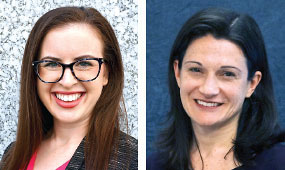Vaccinating Patients With SMI: One Public Hospital’s Experience
Abstract
Physicians, nurses, occupational therapists and other staff at San Francisco’s public safety-net hospitals worked together to help vaccinate patients with serious mental illness (SMI) against COVID-19. Here is their story.

As COVID-19 vaccines are distributed across the United States, an important question continues to challenge medical experts: How will we get vaccines to our most vulnerable populations? Some of the more marginalized groups remain a concern both in terms of their risk of exposure to the virus as well as their access to vaccinations.
Zuckerberg San Francisco General Hospital (ZSFG), the City and County of San Francisco’s safety-net hospital, took early action in providing the Moderna mRNA vaccine to at least one of these groups—people with serious mental illness (SMI).
ZSFG has three inpatient psychiatric units with a total of 52 beds. It serves those with acute psychiatric needs on brief involuntary holds and those with chronic mental illnesses on conservatorships. The hospital also has a forensic unit treating those admitted from the county jail. Patients are primarily uninsured or receive California’s Medicaid. They represent the most severely mentally ill patients in the city, many with comorbidities of homelessness, addiction, or chronic medical needs. The larger medical hospital was chosen as one of seven California hospitals for initial vaccine rollout last December, and in early January, ZSFG’s Department of Psychiatry rolled out the first COVID-19 vaccines for hospitalized psychiatric patients. Although the state of California did not prioritize SMI patients, ZSFG’s hospital leadership, with advocacy from the Department of Psychiatry, felt this was a high-risk group who fell under priority group 1A given the patients’ extended lengths of stay. Essentially, selected patients were considered similar to long-term-care residents and were able to receive vaccination around the same time as those in nursing homes or skilled nursing facilities. Inpatients who would be admitted for at least a month, those with discharge plans to long-term-care facilities, and elderly and/or medically compromised patients were prioritized. Patients who were discharged before receiving their second dose were given follow-up appointments at ZSFG’s outpatient vaccination site or at their long-term-care facility, depending on their discharge plan.

Importantly, the psychiatry units established a dedicated task force to determine a smooth workflow for vaccine delivery. Unit nurses discussed side effects, validated patients’ concerns, and reassured patients that staff would be present to monitor them for safety. Occupational therapists (OTs) used morning meeting time to emphasize patient choice in receiving the vaccine and discussed what research showed about vaccine efficacy. The inpatient psychiatric pharmacists provided the delivery of the vaccine, assisted physicians with orders, and offered additional safety information. Nurses and OTs ultimately led the education and support efforts, as they had more familiarity and rapport with the patients.
On vaccination day, three nurses administered vaccines, one nurse kept the environment calm and secured the vaccine site on the unit, and the other nurses working on the floor answered questions or helped in the waiting areas. OTs taught patients deep breathing exercises to help with anxiety and provided snacks and a coping skills art group during the 15-minute post-vaccine monitoring period. Phone and in-person interpreters were available as needed. Joan Pauline Torres, one of the nurses administering vaccines, noted that many of our patients expressed interest in the vaccine before it was even available in the hospital. “We provided education early so that our patients felt comfortable in their own decision to get vaccinated once it became available to them, … [and] establishing a positive environment around the vaccine was key,” she said. No significant side effects were reported other than occasional muscle aches and mild fever after the second dose, relieved by acetaminophen.
Patients were given the option to decline the vaccine, but we were pleasantly surprised at the acceptance rate on the unit. Of the 30 patients offered vaccines, only three declined. Three other patients were then given the opportunity to receive the vaccine so that no vials were wasted. Vaccine hesitancy has been reported across the country, and patients with SMI can sometimes experience paranoia and mistrust of health care professionals. But we believe the uptake was so high at least in part because our patients are as anxious to get back to normal routines as everyone else. These patients have been disproportionately affected by the COVID-19 virus. They are isolated from their outpatient health care professionals, and their routines are markedly disrupted due to shelter-in-place limitations. And they see this vaccine as the first step toward reconnection with social supports and a return to normal.
Given the psychiatry unit’s success, efforts are once again under way to organize newly admitted patients to receive their first doses while on the unit.
Why was this patient population prioritized in San Francisco while many others anxiously wait to receive their first doses of the mRNA vaccines? “The patients we have the honor of taking care of are often those who have the least in our city—the least in terms of housing, health care, funding, and basic necessities,” said Emily Lee, M.D., director of ZSFG’s inpatient psychiatric services and psychiatric emergency services. “We knew that once our patients left the hospital, the chances of their being able to access the vaccine while simultaneously navigating access to other life essentials was going to be limited. We were thus thrilled that they were prioritized and that we could help them to protect their own health.” ■



